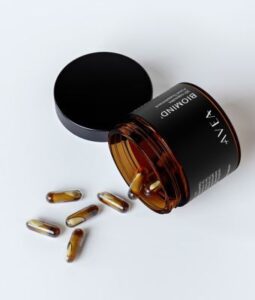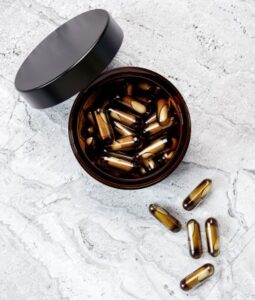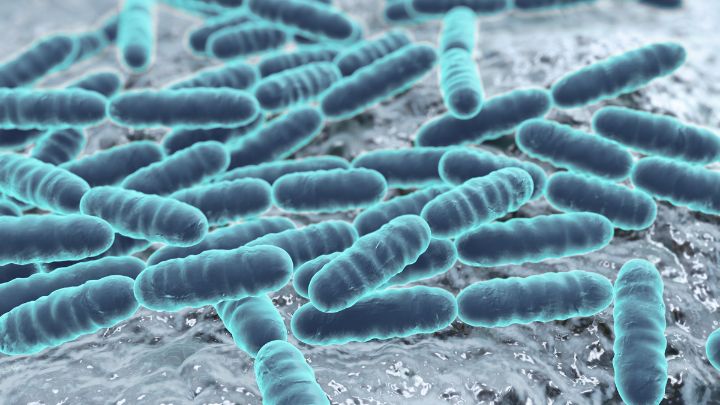We can really think of ourselves as superorganisms—why? Well, we’re made up of both human (eukaryotic) and microbial (prokaryotic) cells.
In fact, our microbiomes are even passed down from one generation to the next, especially during birth and breastfeeding. Mothers, you are the ultimate givers of life, and science got your back on this!
This transfer of beneficial microbes creates a symbiotic and potentially long-lasting microbial community in the child. Whilst some strains are directly inherited, most of our adult microbiomes are shaped by random colonisation over time.
Amongst the first microbes to colonise the infant gut are bifidobacteria, particularly Bifidobacterium breve and Bifidobacterium bifidum, which are uniquely adapted to thrive in this early environment.
These bacteria metabolise special sugars (glycans) found in human milk, boosting gut health and acting as a crucial mechanism for passing beneficial bacteria from mother to child.
Studies have shown that Bifidobacterium breve plays a vital role in shaping a healthy gut from day one. Extensively studied, Bifidobacterium breve has been found to help establish a balanced microbiome that supports digestion, immunity, and overall well-being in adults, proving its importance throughout life.
In this Avea article, we’ll dive deep into the incredible benefits of Bifidobacterium breve and discover why this probiotic is essential for more than just gut health.
In this article
Free guide to reverse your biological age

- Master the science of rejuvenation.
- Apply proven tips to turn back the clock.
- Transform your health with top longevity specialists.
What is Bifidobacterium breve?
Bifidobacterium breve is a beneficial probiotic bacterium naturally found in the human gut, with a particularly high presence in infants, especially those who are breastfed.
Extensive research has highlighted Bifidobacterium breve’s potential health benefits, including:
- Improving cognitive function.
- Preventing gastrointestinal diseases.
- Modulating the immune system.
- Supporting gut health and digestion.
- Reducing inflammation.
- Promoting a healthy microbiome from early life stages.
Its presence in the gut has been linked to so many positive health outcomes, that it has become a focal point of interest in both longevity research and nutritional therapy.
1. Gram positive bacteria
Bifidobacterium breve are gram-positive bacteria, meaning they have a thick cell wall that retains a crystal violet stain used in the Gram staining procedure, which is a key characteristic used in bacterial classification.
This structural feature makes them more resistant to certain environmental stresses, such as the acidic conditions of your stomach, allowing them to survive the journey through your digestive tract.
2. Anaerobic bacteria
Being anaerobic, Bifidobacterium breve thrives in environments with little to no oxygen, such as the human gut. This characteristic is essential for their survival and function in the large intestine, where they contribute to the fermentation of indigestible carbohydrates.
This fermentation process produces short-chain fatty acids), such as acetic acid and lactic acid, which lower the pH of the gut environment, inhibiting the growth of harmful bacteria and supporting a balanced microbial community.
3. Non-motile bacteria
Another of its characteristic is lacking the means to move independently, meaning they are non-motile bacteria. Whilst this might seem as a disadvantage, it’s actually a feature that supports their stability and persistence in the gut environment.
Instead of moving around, Bifidobacterium breve adheres to your gut lining, where it can effectively colonise and exert its beneficial effects. In fact, by residing in the gastrointestinal tracts of humans and other mammals, Bifidobacterium breve plays a pivotal role in maintaining a healthy microbiome, supporting digestion, immune function, and overall health.
When was Bifidobacterium breve first discovered?
The discovery of Bifidobacterium breve dates back to the early 20th century, when researchers first identified the genus Bifidobacterium in the intestines of breastfed infants.
Since then, Bifidobacterium breve has been extensively studied for its health-promoting properties, leading to its widespread use in clinical and nutritional applications.
Over the decades, Bifidobacterium breve has been incorporated into various probiotic formulations, particularly those targeting infants and children, due to its dominance in the infant gut and its crucial role in early life health.
The recognition of its benefits has also expanded into adult health, with ongoing research exploring its potential in areas like cognitive function, weight management, and chronic disease prevention.
Is Bifidobacterium breve a probiotic?
Yes, Bifidobacterium breve is a potent probiotic, offering several health benefits at once. Probiotics are live microorganisms that, when administered in adequate amounts, confer health benefits on the host.
Bifidobacterium breve is well-regarded for its ability to restore and maintain a balanced gut microbiota, which is crucial for digestive health, immune function, and protection against harmful pathogens.
Its probiotic properties are harnessed in supplements and functional foods aimed at preventing and treating various gastrointestinal and immune-related conditions.
Learn the difference between probiotics and prebiotics.
Where is Bifidobacterium breve found?
1. Natural sources of Bifidobacterium breve
Bifidobacterium breve is naturally found in several key environments, including:
- Human gut: Particularly abundant in infants, where it plays a crucial role in establishing a healthy microbiome from birth.
- Breast milk: Passed from mother to baby during breastfeeding. In fact, it represents 80% of the total Bifidobacterium isolated from breast milk.
- Fermented foods: Present in fermented foods such as yoghurt, kefir, and certain cheeses, contributing to gut health.
Discover the difference between kefir and kombucha, both of which are probiotic-rich beverages.
2. Bifidobacterium breve in probiotic supplements
Bifidobacterium breve is a common ingredient in probiotic supplements aimed at supporting gut health, often combined with other strains for enhanced digestive benefits.
Avea’s Biomind probiotic supplement
At Avea, we created Biomind, as a holistic approach to gut health, mental wellbeing, and brain function.
Why should you try Biomind
Biomind is a game changer for your gut and mental well-being.
With 10 powerful strains, including Bifidobacterium breve (3 billion CFUs) and Bifidobacterium bifidum (1 billion CFUs), Biomind delivers a potent 30 billion CFUs per dose, targeting both digestive health and brain function.
Our Bifidobacterium breve is a proprietary strain, developed in partnership with Nordic Biotic—a renowned Danish leader in probiotic research.
Nordic Biotic’s patent-deposited strains are validated through rigorous in vitro and clinical studies, ensuring that each of the 10 strains in Biomind synergise for optimal gut health. This guarantees both efficacy and safety, forming a solid foundation for enhancing your overall well-being.
Bifidobacterium breve and Bifidobacterium bifidum work symbiotically to promote a balanced gut flora, with Bifidobacterium breve enhancing digestion and reducing inflammation, whilst Bifidobacterium bifidum strengthens immune function and supports nutrient absorption.
Biomind’s advanced Duocap® technology, a unique capsule-in-capsule delivery system, ensures a slow, targeted release of probiotics and nutrients, maximising their effectiveness.
This targeted delivery means that the probiotics reach exactly where they need to be in your gut, enhancing nutrient absorption, reducing inflammation, and promoting a strong gut-brain connection for comprehensive wellness.
Factors influencing Bifidobacterium breve in your gut
- Diet: A diet rich in fibre and prebiotics supports the growth of Bifidobacterium breve, whilst constantly feasting on processed foods can reduce its levels.
- Antibiotic use: Regular use of antibiotics can disrupt your gut microbiota and decrease Bifidobacterium breve levels.
- Childbirth and breastfeeding: Vaginal birth and breastfeeding promote the early colonisation of Bifidobacterium breve in infants.
What does Bifidobacterium breve do?
Whilst Bifidobacterium breve is well-known for its role in infant gut health, its benefits extend far beyond early life stages.
Research has shown that maintaining and increasing the presence of this probiotic in your gut throughout life can have lasting positive effects.
As we age, the balance of good bacteria in our gut can shift, leading to digestive issues, inflammation, and even mental health concerns.
In fact, dysbiosis—an imbalance in gut microbiota—is recognised as one of the 12 hallmarks of ageing.
Here’s why increasing the presence of this powerhouse probiotic is beneficial for more than just infants.
1. Cognitive function improvement
Bifidobacterium breve has shown promising effects on cognitive function, particularly in older adults with mild cognitive impairment.
A study demonstrated that supplementation with Bifidobacterium breve significantly improved memory and visuospatial and constructional abilities, suggesting its potential as a therapeutic agent in managing cognitive decline [1].
The mechanisms behind these benefits are thought to involve the modulation of the gut-brain axis, a bidirectional communication pathway between your gut and brain.
By influencing gut microbiota composition, Bifidobacterium breve may reduce systemic inflammation and increase the production of neuroprotective compounds, such as short-chain fatty acids. These effects help mitigate neuroinflammation, a key factor in cognitive decline.
Additionally, Bifidobacterium breve may enhance the integrity of your blood-brain barrier, further protecting your brain from inflammatory damages, thereby supporting overall cognitive health.
2. Prevention of gastrointestinal diseases
Bifidobacterium breve has been studied for its role in preventing gastrointestinal diseases, particularly necrotising enterocolitis (NEC) in preterm infants [2].
NEC is a serious condition characterised by inflammation and bacterial invasion of the intestinal wall, often leading to life-threatening complications.
Studies have shown that Bifidobacterium breve supplementation, sometimes in combination with other probiotics like Lactobacillus casei, can reduce the incidence of NEC, suggesting a protective role in these vulnerable infants. But more studies are needed to prove its significance.
Bifidobacterium breve has also demonstrated protective effects against drug-induced enteropathy, such as damage caused by acetylsalicylic acid. It helps maintain the integrity of the intestinal lining and reduces inflammation, highlighting its potential as a therapeutic agent in gastrointestinal health.
3. Paediatric health benefits
In paediatrics, Bifidobacterium breve is widely used to prevent and treat a variety of conditions, including diarrhoea, colic, celiac disease, and allergic disorders [3].
Its ability to colonise the infant gut effectively makes it particularly beneficial in early life. For instance, Bifidobacterium breve has been shown to reduce the duration and severity of diarrhoea in children and alleviate symptoms of infant colic by modulating gut microbiota composition.
It also plays a role in managing celiac disease by influencing gut inflammation and promoting a balanced immune response.
Bifidobacterium breve is also used to prevent secondary infections in preterm newborns, particularly during antibiotic treatments or chemotherapy, by maintaining a healthy gut barrier and reducing the risk of pathogen overgrowth.
4. Immune modulation and inflammatory response
Bifidobacterium breve has demonstrated significant immune-modulating properties, particularly in reducing inflammation.
A study focusing on a postbiotic extract derived from Bifidobacterium breve showed that it could improve inflammatory and endocrine functions in healthy females [4].
The extract was found to lower levels of pro-inflammatory cytokines, such as IL-6 and TNF-α, whilst also balancing hormones related to stress and immune response.
In another study, Bifidobacterium breve was shown to alleviate colitis in a DSS-induced mouse model, highlighting its role in maintaining mucosal and epithelial barriers [5].
This protective effect is partly due to Bifidobacterium breve’s ability to modulate gut microbes, promoting beneficial bacteria that help sustain gut integrity and prevent excessive immune activation that lead to immune disorders.
5. Body fat reduction and weight management
Bifidobacterium breve has been identified as a promising probiotic for managing body fat and weight.
A clinical trial involving pre-obese adults demonstrated that supplementation with Bifidobacterium breve B-3 significantly reduced body fat mass, particularly in the abdominal area, over a 12-week period [6].
This reduction in body fat was accompanied by slight improvements in metabolic markers, such as triglyceride levels and HDL cholesterol (the bad cholesterol), suggesting broader benefits for metabolic health.
Another 8 weeks, treatment with Bifidobacterium breve, had beneficial effects on insulin sensitivity in youths with obesity [7].
The mechanisms by which Bifidobacterium breve influences weight management are thought to involve the modulation of lipid metabolism and the enhancement of energy expenditure.
By promoting a healthier gut microbiota, Bifidobacterium breve may help regulate fat storage and reduce inflammation, which are key factors in the development of obesity and metabolic syndrome.
6. Mental health and reducing anxiety
Bifidobacterium breve has demonstrated significant potential in improving mental health, particularly by reducing symptoms of anxiety and depression.
Its effects are linked to its role in the gut-brain axis, where gut microbes influence mood and mental well-being. Research shows that Bifidobacterium breve helps alleviate anxiety and depressive symptoms in patients with schizophrenia, as seen through improvements in key mental health scales [8], [9], [10].
Similarly, in animal studies, Bifidobacterium breve reduced anxiety-like behaviours in stressed mice, highlighting its potential as a psychobiotic [11], [12].
These benefits stem from Bifidobacterium breve ability to balance gut microbiota, increase short-chain fatty acids, and boost serotonin precursors like 5-HTP. Its anti-inflammatory properties also play a key role, reducing inflammatory markers that are often elevated in those with anxiety and depression.
Besides, Bifidobacterium breve has shown benefits for postpartum depression and improved mood in elderly populations, further supporting its use for mental health across different life stages [13].
Experience Avea’s next-gen probiotic supplement

- 4x probiotic survival: Advanced Duocap® technology
- Targeted gut-brain support: Panax Ginseng, 10 strains, including Bifidobacterium breve, Vitamin B6 & B12
- Backed by science: 1000+ studies
How many strains of Bifidobacterium breve are there?
Bifidobacterium breve is one of 117 species within the Bifidobacterium genus, with only 11 species found in humans, reflecting their specialised role in human health.
Several strains of B. breve offer distinct health benefits. Avea’s proprietary strain, validated and analysed by Nordic Biotic, has been rigorously tested to ensure its efficacy and viability in
- promoting gut health
- enhancing immune system function
- reducing inflammation
- improving mental health, particularly in managing anxiety and depression.
Our Bifidobacterium breve strain in the Biomind meets stringent quality standards, including a viable cell count of over 400 CFU/g, ensuring its potency in formulations designed for optimal health benefits.
Why do some commercial probiotics fail to colonise the human gut?
You might think the answer lies in probiotic concentration, but the reality is a bit more complex. The struggle for probiotic supplements to successfully colonise the human gut boils down to a few key factors:
- Non-native strains: A lot of probiotic strains found in supplements aren’t native to the human gut. These strains often lack the genetic traits necessary to survive, such as:
- Mucosal adherence—the ability to stick to your gut lining.
- Acid resistance—surviving your stomach’s harsh acidic environment.
Without these key adaptations, these strains struggle to colonise effectively, making them less beneficial in the long run.
- Niche availability and competition: The gut is a packed ecosystem with limited space and resources. For a probiotic strain to establish itself, it needs to find an available niche, but that’s easier said than done:
- Existing bacteria—Often, native strains already occupy prime real estate.
- Competition—There’s fierce competition for nutrients and survival.
New strains, especially those not naturally present, often can’t compete. For example, research has shown that Bifidobacterium longum was more successful in people who didn’t already have native strains of the same species, showing how tough it is for new probiotics to establish when a similar microbe is already present.
- “Like will to like” principle: Probiotic strains have a higher chance of colonisation if similar species already exist in your gut. This may seem counterintuitive given the competition, but it suggests:
- A familiar microbial environment— is more hospitable to related strains.
- Presence of related species—signals that the gut environment is suitable for that type of microbe.
This is a clear reminder that not all probiotics are created equal, and the ability of a probiotic strain to thrive in your gut depends on many factors, which are, mostly, unique to each person.
This is exactly why we’ve carefully selected Bifidobacterium breve for Biomind. As a proprietary, human-adapted strain developed by Nordic Biotic, it possesses the right traits to colonise your gut successfully, delivering real, lasting benefits for both your gut and brain health.
Side effects of Bifidobacterium breve
When taken orally, Bifidobacterium breve is considered safe and well-tolerated, even with long-term use.
For those with a less diverse or imbalanced gut microbiome, introducing a potent probiotic like Bifidobacterium breve might lead to temporary effects such as gas or bloating. This is completely normal and often occurs because the new beneficial bacteria are making their presence known.
When probiotics enter the gut, they start to colonise and compete with the existing microbes, which can lead to a shift in your gut’s microbial balance. This can cause mild discomfort as your system adjusts.
Essentially, the introduction of Bifidobacterium breve helps to rebalance the gut by crowding out harmful bacteria, promoting the growth of beneficial microbes, and supporting digestive function.
These initial symptoms usually subside as your microbiome stabilises and the bacteria establish themselves. Once your system accommodates to this new, healthier balance, you’re more likely to experience the long-term benefits.
So, a little discomfort at first is simply part of the process of restoring harmony in your gut.
Avea’s probiotic supplement: Biomind

- Advanced Duocap® technology
- Targeted brain-mind support
- 30 billion CFUs of well-researched probiotics, including Bifidobacterium breve
The gut-mind axis
The gut-mind axis, also known as the microbiota-gut-brain axis, represents the complex, bidirectional communication between your gut and brain. This connection is fundamental to how your body maintains balance.
Conditions and symptoms linked to the gut-mind axis
- Irritable bowel syndrome and functional constipation/diarrhoea.
- Anxiety and depressive disorders.
- Non-cardiac chest pain.
- Infant colic.
- Functional dyspepsia and dysphagia.
- Gastroparesis and anismus.
- Chronic stress and fatigue.
- Chronic pain and visceral hypersensitivity.
- Obesity.
- Neurodevelopmental disorders, including autism.
- Neurodegenerative disorders, such as Parkinson’s disease.
- Nerve-related pain conditions, like multiple sclerosis.
Bidirectional communication
Your gut and brain are in constant conversation through neural, hormonal, metabolic, and immune signals, with gut bacteria playing a central role.
Neurotransmitters like serotonin, largely produced in the gut, and short-chain fatty acids from gut microbes, are key players. Think of it as an orchestra—every part needs to harmonise for mental and digestive balance.
Mechanisms of interaction:
- Immune system: Gut microbes regulate inflammation, closely linked to mood disorders.
- Vagus nerve: Acts like a phone line, transmitting signals between your gut and brain.
- Neurotransmitters: Gut bacteria produce serotonin, dopamine, and GABA, regulating mood and anxiety.
- Microbial Metabolites: Short-chain fatty acids reduce inflammation and promote neurogenesis, supporting both gut health and brain function.
Impact on mental health
Gut microbiota is increasingly recognised as a major factor in mental health. Dysbiosis (imbalance in gut bacteria) is linked to anxiety, depression, schizophrenia, and neurodegenerative diseases like Parkinson’s and Alzheimer’s.
Research suggests that improving the gut microbiota, particularly with strains like Bifidobacterium breve, can alleviate symptoms of these conditions.
Stress and the gut-mind axis
Stress impacts your gut-brain connection in both directions. Psychological stress disrupts your gut microbiota, whilst an unhealthy gut can worsen stress, creating a vicious cycle of inflammation, microbial imbalance, and mood disturbances.
Therapeutic potential
Probiotics like Bifidobacterium breve act as “psychobiotics,” reducing inflammation, promoting brain-friendly compounds, and balancing the microbiota, improving mood and cognitive function. Other interventions, of course, include dietary and lifestyle changes, prebiotics, and faecal microbiota transplants for severe cases.
Learn more about why your gut microbiota matters from Dr Will Bulsiewicz, the gut doctor.
References
















